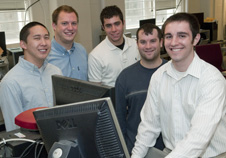Lending a Mind-Controlled Hand

A robot named DARWiN may be the next evolutionary step in the way people with disabilities are able to complete everyday tasks.
Created by Northeastern University engineering students as their senior capstone project, the Disability Assistant Robot With i (Eye) Navigation robot could help someone with a physical disability become more independent. The system allows a user to look at different parts of a computer screen to control the robot, which can move from room to room and pick up items like mail, keys or medicine.
“We came up with the technologies we wanted to use first — eye-tracking and brain control,” said group leader Anthony “Tony” DiPasquale. “We liked the idea of a robot that [incorporated] those two things, so we came up with an assistant for the disabled who have trouble using their hands.”
The team also included seniors Jason Turcotte, Huy Tran, Jeremy Egan, Brian Nelson and Frank Viera. They were supervised by Waleed Meleis, an associate professor of electrical and computer engineering.
After determining that a brain-control device was impractical due to the long training time required, the team developed a computer interface that tracks where on the screen a person is looking, a skill that takes only about an hour to learn.
A camera mounted on the robot’s arm sends a video signal of what DARWiN sees to a special application running on the user’s computer. From this application, a user can completely control DARWiN simply by looking at different areas on their computer screen. If the user is able to speak, DARWiN will also respond to voice commands.
Though the tasks seem trivial, say members of the team, DARWiN is important because it can free a disabled person of the inconvenience of having to rely on someone else to execute simple tasks they would otherwise be unable to perform.
Capstone projects provide engineering students with a rich experiential-learning opportunity, enabling them to build on their innovative ideas through use-inspired research and development at a level of complexity more typical of graduate studies.
Students working on the projects, Meleis explains, work closely with members of the faculty as well as colleagues from prior co-op employers, many of which hire Northeastern graduates as full-time employees.
“Their co-op jobs have informed and guided their selection of projects,” Meleis said. “They get parts from their co-op employers and they get ideas. And often, students will go back to their co-op employer after graduation, so they bring everything they learned in capstone back with them.”
To learn more click here